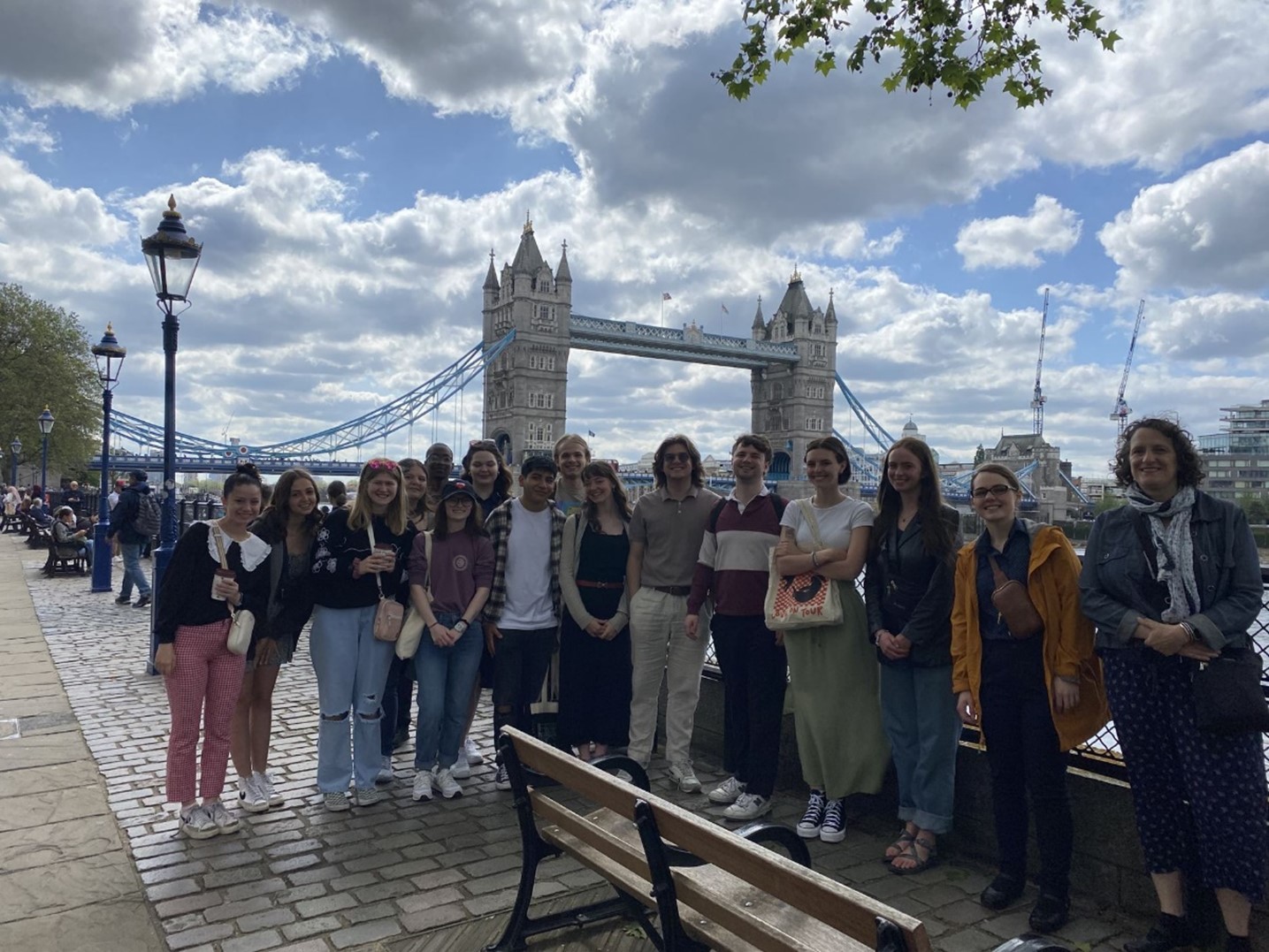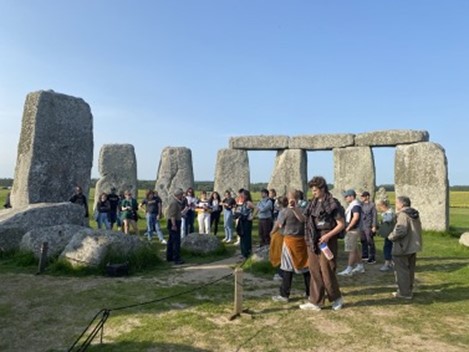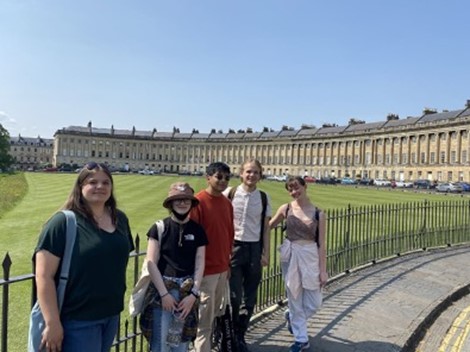Humanities Learning Abroad Feature: London Seminar in Literature and Culture

The London Seminar in Literature & Culture offers students an unparalleled opportunity to immerse themselves in the rich history and culture of one of the world's most iconic cities. Led by esteemed faculty members from the Department of English, the program combines rigorous academic study with hands-on cultural exploration. Over several weeks, students engage in classroom learning during the mornings, followed by afternoons dedicated to excursions throughout London. Participants earn six upper-division English credits and fulfill the University's International Requirement. Outings are curated to complement course readings, allowing students to experience firsthand the city's world-renowned museums, historic sites, and various neighborhoods. The program is designed to foster a deep understanding of both the literature and the cultural context in which it was created.

2024 Learning Abroad Final Dinner in Kensington
Short-term learning abroad programs not only fit within busy academic schedules but also provide a transformative experience that reaches far beyond the classroom. Supported by the English Department's Gordon B. Hinckley Endowment for British Studies and the J. Willard and Alice S. Marriott Foundation Study Abroad Endowment, each enrolled student participant receives up to $1,000 in scholarships, making this once-in-a-lifetime experience more accessible. The commitment to making learning abroad accessible through generous scholarships and departmental contributions ensures that students from all backgrounds can participate in these life-changing opportunities. With additional funding from the Office for Global Engagement, which annually awards over $250,000 in scholarships, studying abroad is an affordable reality for many students.
Each year different faculty members lead the seminar, bringing their unique expertise and perspectives to the program. This year's course, "Street Scenes: Imagining Cosmopolitan London," was directed by Professors Stacey Margolis, Matthew Potolsky, and Jane England, who shared their thoughts on the program:
The academic portion of the class considered the changing nature of urban life as it has been represented in poetry and fiction from the 19th century to the present day. We read Romantic poetry (by William Blake, William Wordsworth and John Keats), works by nineteenth-century American tourists (like Washington Irving and Herman Melville), works of urban and aesthetic theory (by John Ruskin and Georg Simmel), Victorian accounts of urban poverty (by Charles Dickens and Henry Mayhew), works by women and immigrants that explored their unique experience of city life (including Virginia Woolf and Samuel Selvon), and watched films (like Children of Men) that imagine London’s future.
We were lucky to have an extraordinary group of students—bright, enthusiastic, and curious. More than anything else, we wanted them to experience the city we were reading about, to immerse themselves in the art and culture of London. To that end, we arranged class excursions to correspond with our academic studies. After reading Blake, we visited the Print Room of the British Museum to look at Blake’s original handmade art books. After reading Keats, we went to Hampstead Heath, an urban park he describes in his poetry. After reading Melville’s account of the Inns of Court, we visited Middle Temple Hall and held class in one of its beautiful old rooms. After reading Dickens and Mayhew, we toured Dickens’s house in Bloomsbury and then traveled to Birmingham, where we explored a Victorian Back-to-Backs—perfectly preserved in its nineteenth-century form—and the exhibit of Pre-Raphaelite works at the recently reopened Birmingham Museum of Art. In addition, we were lucky enough to see a performance of Shakespeare’s Much Ado About Nothing at the Globe, take a tour of the street art that has flourished in the Shoreditch neighborhood, visit the Docklands Museum, and see London Tide, a new play based on Dickens’s Our Mutual Friend, at the National Theater.
One of our favorite moments of the course was visiting Westminster Abbey after reading about Irving’s visit there in 1819. He had described “an interruption of madcap boys from Westminster School, playing football” disturbing “the monastic stillness of the place” and “making the vaulted passages and mouldering tombs echo with their merriment.” While waiting to enter the Abbey on a Monday afternoon, our students noticed that the boys from the still-operating Westminster School were playing soccer on the green outside. It was the kind of amazing coincidence that can happen in a historic city, and it really seemed for a moment that nineteenth-century literature had come alive.
The year prior was led by Professor Anne Jamison, here's what she shared on her expereince:

Stonehenge Inner Circle
I read a lot about the death of the humanities. Here’s how I saw them come alive this summer.
I took a group of sixteen University of Utah students to London. For five weeks, we had three hours of class in the morning and many more hours of outings, tours, and trips. My students lived together across from Kensington Gardens, where they often did their reading.
They had a private viewing at Stonehenge and saw Roman ruins in Bath. They went behind the scenes at the British Museum to look at William Blake’s hand-printed books. They saw Shakespeare at the Globe, a one-man show in Shepherd’s Bush, the Knights Templar in effigy, and the Greenwich meridian.
As a group, we walked miles a day, often in the carefully documented footsteps of fictional characters, visiting the places where things actually didn’t happen but feel more real than those that did. They compared these fictional happenings to histories that tend not to be marked by the city’s blue commemorative plaques: smog and sewage and slavery, child labor and incarceration, Empire and its lingering legacies.
We talked about how literature can preserve history for us, but also change it, both after the fact and in the telling. They analyzed how a story can filter the past to meet its own acknowledged and unacknowledged aims.
We visited a Brixton Market bookstore specializing in diverse books to see how children’s literature is (slowly) breaking from the chromatically-challenged childhood the nineteenth century imagined for us and spread throughout the world.
My students also visited Oxford, toured the Bodleian Library with a rival college porter’s royalist daughter who had them act out a disciplinary hearing for Oscar Wilde. They compared what they’d seen and read of London to the secluded walks and cloistered greens that gave birth to modern fantasy.
They thought intensely about how that university is different from the one they now attend. They marveled at how people like Tolkien and C. S. Lewis would get together for fun to talk about reading and writing, and how students were still doing that, and now they themselves were doing it too—in the same pub! Some singled this out as the most amazing thing they learned or did on the whole trip, and they kept at it, even after the trip was over.

Bath Royal Crescent
They’d start class by saying, 'Some of us were talking about Oliver Twist last night...' It made me want to cry. It was such a basic part of my college experience, talking about books and ideas in dorm rooms and diners and cafés—the classroom sometimes felt like an afterthought. I know this experience is foreign to many of my students. They live off-campus, have jobs, and often have children; they don’t have extra time. I often give a small group assignment: go to a non-academic space and talk about the reading. Send me a selfie. It helps them put it on their calendar.
On a trip like ours, it just happens. Of course, students engaged in learning abroad develop characteristics employers say they want—adaptability, flexibility, team-building, critical thinking, independence, broader perspective—but that’s not really the point. The point is to learn so intensely that you feel like you might explode.
These students are (now) a privileged bunch, but they didn’t start off that way. They’re state school students at one of the lowest-cost flagship universities in the country. This course is also generously subsidized by an endowment, bringing it
more within reach of a broader range of students. Most in my group were traveling abroad for the first time. One wept at the sight of Blake’s books because she didn’t think she was the kind of person that got to see that kind of thing.
The children of the wealthy have always had these experiences. They assume they are the kind of person who gets to see Blake (though Blake wouldn’t like this). They have always studied abroad, and they have always studied humanities. They will continue to do so at the elite private colleges that know what adds value for those who can pay for it. What is an anomaly, historically speaking, is the brief and rapidly vanishing period when we thought that anyone else should have access.
Whether strolling through the historic streets of Kensington, participating in guided tours of London's iconic neighborhoods, or visiting world-renowned museums, the London Seminar in Literature & Culture offers students an unforgettable journey of discovery and learning.
